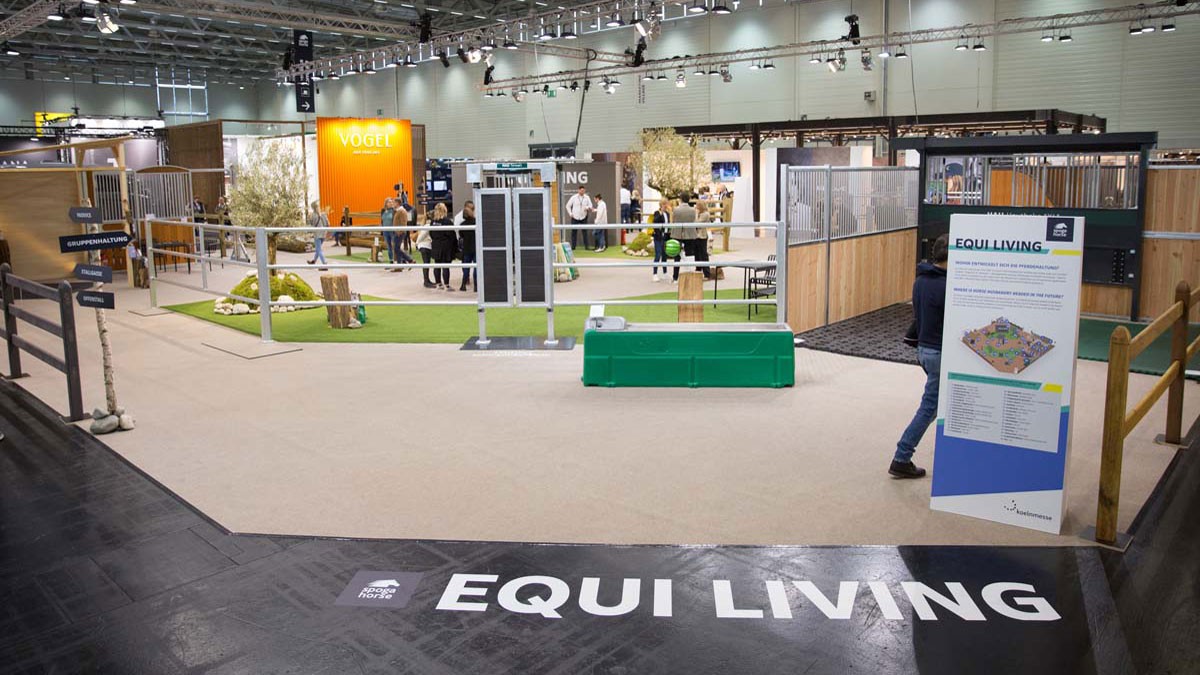EQUI LIVING special exhibit horse habitat - From box stall to playground?
Cuddly, crackling stuffed animals, nibbling sticks, toys and grain flavoured with vanilla and buttercream. Are horses under-challenged in 2022 or are their owners overwhelmed with keeping their horses busy?

Image: Kentucky Horseware
At first glance, some box stall accessories look as if they provide more pleasure for the owner than the horse, but we are dealing with more than just a 'flash in the pan' line of products. The horse's habitat is changing, and for good reasons.
Horse husbandry is changing
For several years, more and more studies have explored the genuine needs of horses. Horse husbandry concepts are therefore evolving to benefit the horse, based on the “3Fs'' from “The Horse´s Manifesto” written by Equine Behaviourist Lauren Fraser MSc, CHBC (see here ):
Die 3 Fs: Feunde (Friends) - Futter (Forage) - Freiheit (Freedom)
F#1: Friends
Horses are herd and prey animals. Horses need other horses to detect danger and ensure safety, thus survival. They have a need to make friends with other horses and express their natural behaviour through play and grooming. The companionship of other horses provides safety and comfort to them. They use a complex and subtle communication system that utilizes body language. Anything that is “loud/noisy” would just draw attention from predators. As a herd animal, the horse needs a strong and solid social environment in order to be healthy and happy. Horses need other horses.
F#2: Forage
Different breeds and age groups have different nutritional needs, both with hay and minerals. The horse's digestive system is designed to process food constantly, preferably in the form of high fibre and cellulose rich grass. Trouble can occur (OR It can lead to health issues) when a horse is denied this form of food intake, if feedings are spaced too far apart or the horse is exposed to excessively rich grass. Unlimited access to grass or hay can lead to challenges, too. Well planned and individually calculated feeding is important to maintaining a healthy horse.
F#3: Freedom
Freedom isn´t just freedom of movement, it is also freedom from stress, fear and the freedom to choose. In nature, horses can choose freely how and when they like to interact with the herd, when and how much they eat and they can choose when and how they want to move (roll, play, rest, groom, move around). Freedom entails personal choice and free will.
Each aspect features a wide range of complex and scientific research to support it. These evidence-based findings have made their way to the barn. The digital age has accelerated the exchange of information like never before.
“Horse friendly” and “individual care”
If one wants a happy and healthy horse, then attempt to meet the individual needs of each horse, physically, mentally and emotionally. Many different concepts of horse husbandry are emerging that strive to meet the 3Fs criteria, and they are increasingly in demand. However, successful and healthy group husbandry is much more than simply keeping many horses of different (or the same) breeds and ages in one area, especially when space is limited. Substantial experience and knowledge about horse behaviour, individual needs and herd dynamics is required. Is every horse able to live in a group environment?

Lauren Fraser MSc, CHBC Equine Behaviourist
“Some horses will have been selectively bred to have hair coats that may not be suitable for the weather where they are made to live, but selective breeding cannot remove the horse's need to live in social groupings. This need has not been bred out of them, no more than the need of their gastrointestinal system to constantly be processing cellulose-rich forage. However, a person may falsely perceive this to be the case if the horse they are observing was denied the opportunity to live a normal social life during critical developmental periods. For example, if a mare and foal are kept socially isolated from others because of the perceived value of the pair, the foal will indeed develop abnormal social behaviour: be unable to engage in normal social relationships, struggle to understand/engage in normal communication from other horses, be overly stressed in the presence or absence of others etc. This will result in behaviour that suggests to an uneducated observer that the horse 'prefers' to live in a stall, but it is an observation based on behavioural damage created from the lack of normal social opportunities when young. We know from decades of research on a wide range of social species, including horses, that lack of exposure to normal experiences (including social ones) during critical socialization windows negatively impairs behaviour, for the life of the animal. Indeed, a good percentage of my caseload is seeing horses who have been denied access to the 3F's whether when young and developing, or later in life. Doing so creates unwanted behaviours resulting from the stress the horse experiences from living - what is from their perspective - an impoverished life.”
- Lauren Fraser MSc, CHBC Equine Behaviourist

Image: Hay depot Hau equestrian sports via Stallbedarf24
If group dynamics and/or the area have not been well thought out, there can be a risk of injury in group environments. Ponies respond differently to winter meadows than the common warmblood. Sensible and healthy husbandry, along with customized feeding is time-consuming. This increases the complexity for the industry, horse owners and, above all, stable operators.
How can individual care be administered at the request of the owner? How can boredom be addressed when space is limited? How can close to constant food intake be managed without overfeeding the horse? Manufacturers are providing solutions:
From toys to incentives for movement and mental stimulation, breed-specific feed, automated and time-controlled hay stations and pasture gates; the show special “Equi Living” shows where and how horse habitat is changing, and we invite you on an exciting journey of discovery.
